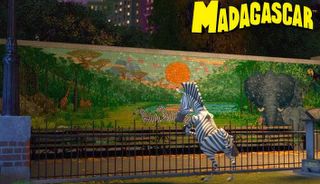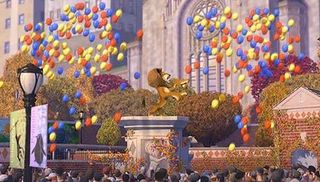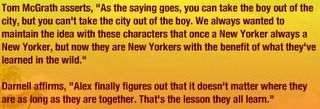The Politics in the Movie Madagascar
6.06.2005
How rare in a cinema will anyone see an actual film burn on screen in their lifetime? Fans of Cinema Paradiso would know how it would feel seeing the film bubbling away on screen. Not everyone however, would relate to the surprise and the disgust when halfway into enjoying a film comes a sudden stop and one sees the film evaporating before ones eyes. I have that rare priviledge when I watched the animated movie, Madagascar with my girlfriend, Drea.
What makes this burning of the film relevant, to the politics of the movie? I will go to that later.

I considered the first half of the movie flat for failing to elicit any genuine laughter from me, nor from much of the audience. I thought it is just mildly amusing and falls short of my expectations. But...
Just before the film burned however, Drea had a eureka that activated my political eye: A scene where the Statue of Liberty burned, collapsed like the World Trade Center, and ended up like a cutaway from the original Planet of the Apes (1968). The Lady Liberty is halfway buried in the beach (or half-destroyed); herself a silent witness to the destructive nature of man in a previous era.
"The desire for Freedom is a pervasive theme in human history. It is within man's character to desire to be free, because he is free from the onset."
This metaphor could never be more made any better as it was timely. The late sixties and seventies is a time of much troubles in our history. With that as a reminder, we watched the film with a deeper understanding that made us enjoy the movie to its core.If you haven't seen the movie, please be warned of the spoilers below. I suggest you watch first let it reveal itself to you.
I am immediately reminded of George Orwell's Animal Farm and the use of symbolism using animals and the setting itself. It needed to be understood with political symbols, and layers of humor be stripped till the symbolism becomes very clear: The current state of politics in the United States and the world.What is life like in the 'Wild'?
The movie begins quite any normal kiddy movie would: a simple plot. At New York's Central Park Zoo, a lion (Alex), a zebra (Marty), a giraffe (Melman), and a hippo (Gloria) are best friends and stars of the show. But when one of the animals goes missing from their cage, the other three break free to look for him, only to find themselves reunited ... On a ship en route to the island of Madagascar. When their vessel capsizes off the coast, however, the friends, who have all been raised in captivity, learn first-hand what life can be like in the wild. *
The desire for freedom is a pervasive theme in human history. It is within man's character to desire to be free - because he is free from the onset. Any artificial restriction to this inherent freedom invites man's revolting nature. In the movie, Marty, the Zebra, dreams to be free from the confines of the zoo. He wants to enjoy the sprawling green fields and experience nature at its finest! Why the story is set in a New York Zoo is an interesting point. It invites the viewer to see the Zoo as America, and the Wild as everything foreign to the New Yorkers.
In the movie, Marty, the Zebra, dreams to be free from the confines of the zoo. He wants to enjoy the sprawling green fields and experience nature at its finest!
His name seems to be a contraction of the word marty(r). While that cannot be verified, his character is an idealist. He desires to experience a world beyond the monochromatic and restrictive nature that is the New York Central Park Zoo. It would seem that he is the symbol of that portion in the population of America idealist enough to demand a return to the original intention of the Declaration of Independence. In fact he wants more than that. He represents that sector that demands ultimate and absolute freedom.The conflict begins when Alex, the Lion who is the star of the Zoo, questions why there is even a need to see life in the wild. The use of the Lion as a symbol is only the beginning. The Lion is the king of the Zoo; he is Power. He represents the sector of American society that has power. Alex is for Alexander the Great, the leader, and thus the Government.

In the wild their friendship is tested and soon they are divided into factions. This is reminiscent of how America, through the New Yorker animals is divided. Allow me to focus on each character's symbolism.
The use of the Zebra as an idealist is no accident. Marty is described through a historically racist joke as a confused individual, one that is not certain if he is Black animal (tainted) with white stripes --- or a White animal (tainted) with black stripes. This line is a reference to an old academic joke that begins most discourse on racism. When asked whether any zebra is one or the other, the answer depends on who gives you the answer. A black man will give the former, a white man will claim the latter.
The giraffe Melman, a hypochondriac is representative of the paranoid public. The slanky and tall figure of the giraffe is a presence akin to that of the many levels of society from top to bottom. He is afraid to even spot a brown spot in his body even if giraffes are supposed to have that. He needs a constant pill and MRI to keep him sane. He needs to be fed reports (media) that he is not sick, and that everything in society is A-OK. While the idealism of Marty is dangerous, so can be paranoia, as we see during the first part of the movie where the giraffe cannot be his best self.
Gloria, the hippo on the other hand represents the ironic 'glory' of the middle ground, the neutral or undecided, apathetic, I'll-do-what-I-have-to-do crowd of the political spectrum who while posing any danger to society (the Zoo), is a waste of potential. Content in doing the same performance in the Zoo we see that stagnancy of course, is a danger in itself.

"The Four Characters represent the United States as a whole"
This difference in the politics among them foreshadows the ultimate division among the animal friends. In the wild, they encounter a congregation of lemurs partying, only to see them under attack from the Foosa --- radical feline carnivores that threaten the existence of lemur civilization. Alex is declared a savior for attacking the Foosa and saving a baby lemur without his intention to be so. In a way, they find that the wild is not as disorganized as they think it is. It is civilized in its own way. It's that realization that some conservatives have yet to make.
Here already is the parallelism of The US saving the world from the chaos that is Terrorism. The lemurs are banded like the United Nations, with a leader powerless to enact anything to combat the plague of the Foosa, without the US intervention - re: Kofi Annan. Alex's attack through the effort of the used-to-be neutral and apathetic Gloria, now there in no fault of her own. For a moment the Foosa/Terrorists are gone.
The New York "Giants" or "Freaks" as they are called differ significantly in size, as if to highlight the power difference among the lemur nation of the world and the US. While this is true to a political point, it begs the question of the structure of the state in the modern world. But yes, that of course is another discussion.
I am certain the size of the main characters, while needed the movie to highlight the main characters is an industry standard.
We are being warned: Power is dangerous, but so is apathy, paranoia, and even ultra-liberalism or radicalism. Each should remain in check of each other.
However, the fact that the enemy - the Foosa - bad-asses that are often created bigger than the heroes of the movies -- are made significantly smaller than our four New York Animals, yet big enough to attack the lemurs... This begs the question 'Why?'. They are structured to operate in separate disorganized groups as well like terrorists cells do. They do not speak any language in the movie at all, unlike other animals which are metaphors of the nations of the world. The coincidence is unmistakable. It has to mean something.
Going back to the movie, While used to being fed the "steak" in the Zoo, (an incidental play on the word 'stake'), Alex the lion struggles to find food for himself in the Wild and returns to his instinctive carnivorous self. He hallucinates and sees the other animals as food instead of friends. He tries to resist and avoid attacking them. He tries to stop hallucination that will feed him his 'stake'. But he is powerless to the power in his paws (hands). Can I say Pan-Americanism?
In the middle of lemur celebrations he attacks his friend Marty, the Zebra and exposes himself to criticism of the United Lemur Nation. He retreats on his own and finds himself alone. The idealist, rebellious, Zebra does not give up on his friend the President...Err... Lion-king, and tries to sing their favorite song, New York, New York and changing the lyrics from "I want to be a part of it, New York, New York" to a double entendre:
We're all a big part of it, New York, New York... --- as if to hint on America's current state of affairs.
Only till the point when the four animal friends banded together and fight the Foosa together with the United Lemur Nation were they able to quell the enemies of the island.
In the end, Alex is rationed with small portions of fish a la sushi. It's hoped that he will not revert to his corrupting self, and his hunger for power is kept in check. They are ready to go back to the New York when the reality is projected to the audience before the end credits --- the Island is their World, and there is no way back to the comforts of NYC, America.
Do we need animals to remind us about our Freedom?
It's a silent message of the police power that has been granted to America, not by right or manifest destiny, but by the circumstances of World War 2. The world needed his help, but he must not be too hungry to enslave the world. F.D.Roosevelt and the other leaders of the Allies knows that the world need not return to the era of totalitarian Hitler hence the enactment of the Universal Charter on Human Rights, and the creation of Institutions that will safeguard the ideals of the World thru the United Nations --- not the Unite States on its own. The UN was created that there will be no more war in the world. But humanity it seems is a stubborn lot. The same tendency to elect the wrong leaders come up every time...
when the four animal friends
banded together to fight the Foosa
together with the United Lemur Nation were they able to quell the enemies of the Madagascar
interestingly, George Orwell's novel, Animal Farm appeared in stores the same month that the atomic bombs were dropped on Hiroshima and Nagasaki. Orwell made no secret of the fact that his writing, and Animal Farm in particular, was single-mindedly focused on the obliteration of totalitarian regimes. * The creation of political sentiments in art always happen when sentiments to dissent are charged up. Or when a warning is needed, to save us from impending doom.
"Every line of serious work that I have written since 1936 has been written, directly or indirectly, against totalitarianism...Animal Farm was the first book in which I tried, with full consciousness of what I was doing, to fuse political purpose and artistic purpose into one whole." He says. *
While I am not certain about the intentions or politics of the two directors and the many writers of Madagascar, I could agree enough that George Orwell's despise of totalitarianism and unchecked superpowers of the world as dangers to humanity IS the same message in the movie Madagascar.
Understanding the movie Madagascar with political eyes thus makes it a more enjoyable film. Far from what critics call as bland or yet another crapper from DreamWorks
passably amusing or presents not much crossover appeal to parents, it is rather an intelligent film. It having been marketed as a funny film is questionable, for it delivers only half of that. But this does not diminish the importance of the concept of power in its plot. It all just makes it a most worthwhile movie to see.

The directors couldn't be more right.
Now about the burning of the film: How cool is it if the film burning itself is actually a part of the movie? Blame me if this is all over reading, but how much of a coincidence do we need to make sense of this film in today's world affairs? If the film burned in the middle and it is part of the screenplay, it will be a far better film --- one that warns us of the troubles of our politics. I guess I'm asking too much from it. But hey!
Acceptance of diversity is a pre-requisite to survival in the wild that is the world. To battle the chaos of Terrorism, a united effort is needed respecting the rights of every nation on earth. The United States finds itself in a position of priviledge and responsibility in the world today, but it does not mean Lady Liberty will be set aside. Power is a dangerous thing, yet it is what is needed to enact change. The world does not need a savior-nation, rather a United Stand --- u-s, us, we, from all nations that rise to the same call to civilize the wild. Even lemurs know how to party, they are civilized in their own ways.
Post script: Democrats, do you hear the lemurs crying Alex is out to eat them? Come on! Do something. There are many more symbols in the movie that need more elaborate explanation like the French Bon Voyage, that could not save the animals, and the British Chimpanzees that could not even help the New Yorkers. But do we really need animals to remind us about our Freedom? I believe that needs no more explanation.
Labels: Art, Politics, US Politics
posted by Jdavies @ 6/06/2005,
![]()
![]()
0 Comments:
The Author
J.Davies

Jdavies lives in Quezon City, Philippines and has been blogging since 2002. A brand manager in a leading technology company and a freelance new media/web strategy consultant, he has refocused his blogging from personal, political & sociological observations, to marketing-related efforts and Internet trends that are relevant to his career and branding advocacies.
About This Blog
This blog is a depot of thoughts and observations on marketing trends which remain personally relevant to the Author as far as his marketing career is concerned. Having evolved from the personal blog of Jdavies, much of the earlier work contained herein are laced with personal speculation, political views, and similar advocacies. These posts are being kept for posterity's sake and for no other reason. No effort is being made to claim that the author will not contradict himself from his previous positions or that such advocacies are absolute.
Contact
Request access to my Linked-in Profile
